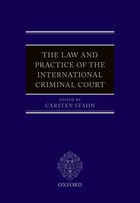| |
Pris: 2377 SEK exkl. moms  |  The International Criminal Court is a controversial and important body within international law; one that is significantly growing in importance, particularly as other international criminal tribunals close down. After a decade of Court practice, this book takes stock of the activities of the International Criminal Court, identifying the key issues in need of re-thinking or potential reform. The International Criminal Court is a controversial and important body within international law; one that is significantly growing in importance, particularly as other international criminal tribunals close down. After a decade of Court practice, this book takes stock of the activities of the International Criminal Court, identifying the key issues in need of re-thinking or potential reform.
It provides a systematic and in-depth thematic account of the law and practice of the Court, including its changes context, the challenges it faces, and its overall contribution to international criminal law. The book is written by over forty leading practitioners and scholars from both inside and outside the Court. They provide an unparallelled insight into the Court as an institution, its jurisprudence, the impact of its activities, and its future development.
The work addresses the ways in which the practice of the International Criminal Court has emerged, and identifies ways in which this practice could be refined or improved in future cases. The book is organised along six key themes: (i) the context of International Criminal Court investigations and prosecutions; (ii) the relationship of the Court to domestic jurisdictions; (iii) prosecutorial policy and practice; (iv) the applicable law; (v) fairness and expeditiousness of proceedings; and (vi) its impact and lessons learned. It shows the ways in which the Court has offered fresh perspectives on the theorization and conception of crimes, charges and individual criminal responsibility.
It examines the procedural framework of the Court, including the functioning of different stages of proceedings. The Court's decisions have significant repercussions: on domestic law, criminal theory, and the law of other international courts and tribunals. In this context, the book assesses the extent to which specific approaches and assumptions, both positive and negative, regarding the potential impact of the Court are in need of re-thinking.
This book will be essential reading for practitioners, scholars, and students of international criminal law.
Contents:
Part 1: Context, Challenges, and Constraints
1: Richard Dicker: The ICC and 'Double Standards' of International Justice
2: Leslie Vinjamuri: The ICC and the Politics of Conflict
3: Anton Du Plessis & Ottilia Anna Maunganidze: The ICC and the African Union
4: Stuart Ford: Funding the Court
5: Jonathan O'Donohue: The ICC and Oversight by the Assembly of States Parties
Part 2: The Relationship to Domestic Jurisdictions
6: Rod Rastan: Jurisdictional Scope of Situations
7: Mohamed M El Zeidy: Ad hoc Declarations of Acceptance of Jurisdiction
8: Harmen van der Wilt: Self-Referrals
9: Carsten Stahn: Admissibility Challenges Before the ICC
10: Robert Cryer: The International Criminal Court and its Relationship to Non-States Parties
11: Dov Jacobs: State Cooperation and Immunities
Part 3: Prosecutorial Policy and Practice
12: Paul Seils: Making the Most of Preliminary Examinations
13: Susana SáCouto: ICC Investigations
14: Fabricio Guariglia: The Office of the Prosecutor and the Selection of Situations and Cases
15: William Schabas: Selecting Cases and Charging Crimes
16: Jenia Iontcheva Turner: Accountability of International Prosecutors
Part 4: The ICC and Its Applicable Law
17: Gilbert Bitti: The ICC and the Treatment of Sources of Law under Article 21
18: Joseph Powderly: The ICC and Treaty Interpretation
19: Elies van Sliedregt: Theorizing Modes of Liability Under Article 25
20: Jens David Ohlin: The ICC and Co-Perpetration
21: Thomas Weigend: Indirect Perpetration
22: Hector Olasolo: Other Forms of Liability
23: Kai Ambos: The ICC and JCE: What Contribution is Required Under Article 25 (3)(d)?
24: Alejandro Kiss: Superior Responsibility Under Article 28
25: Mohamed Elewa Badar: Mental Elements
26: Claus Kress: Genocide
27: Darryl Robinson: Three Concepts of Crimes Against Humanity
28: Michael Newton: Charging War Crimes: Policy and Prognosis
29: Roger S Clark: The Crime of Aggression
30: Niamh Hayes: Charging Sexual and Gender-based violence
31: Carl-Friedrich Stuckenberg: Cumulative Charges and Cumulative Convictions
Part 5: Fairness and Expeditiousness Of ICC Proceedings
32: Simon De Smet: The Role of the Pre-Trial Chamber
33: Ekkehard Withopf: Confirmation of Charges
34: Håkan Friman: Trial Procedures
35: Margaret deGuzman: Sentencing Theory and Practice
36: Volker Nerlich: Appeals Procedure
37: Kevin Heller: Legal Qualification of Facts under Regulation 55
38: Karim Khan QC: Evidence and Disclosure - A Defence Perspective
39: Alex Whiting: Evidence and Disclosure - A Prosecutorial Perspective
40: Markus Eikel: The ICC and the Protection of Witnesses
41: Sergey Vasiliev: Victim Participation in the Practice of the ICC
42: Conor McCarthy: Reparations Before the ICC: Issues and Challenges
Part 6: Impact, 'Legacy', and Lessons Learned
43: Nick Grono & Anna de Courcy Wheeler: Deterrence and the ICC
44: Elizabeth Evenson: Complementarity and 'Legacy'
45: Andrew Cayley QC: Living Legacy: What Has Been Learned About the Practice of Strengthening Domestic Investigative and Prosecutorial Capacity?
Carsten Stahn: Conclusion | | |
|